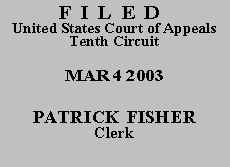

| JOHN LATTA,
Plaintiff - Appellant, and TRACY LATTA; SADIE LATTA, by and through her Mother and next friend, TRACY LATTA, Plaintiff, v. GREAT AMERICAN LIFE INSURANCE COMPANY, Defendant - Appellee. |
|
Plaintiff-appellant John Latta appeals from the district court's order granting summary judgment in favor of defendant Great American Life Insurance Company (Great American) on Mr. Latta's claim for breach of fiduciary duty. We affirm.
This case arises out of Mr. Latta's application for a life insurance policy with Great American. Both Mr. Latta and his wife, Tracy Latta, applied for life insurance on April 16, 2000. At the time of their applications, each signed a Notice and Consent for Testing form, in which they agreed to blood testing, including HIV testing, in connection with their applications for insurance. This form contained the following provision:
If your HIV test results are normal, no routine notification will be sent to you. If the HIV test results are other than normal, the Insurer or your designated physician will contact you. The Insurer may also contact you if there are other abnormal test results which, in the Insurer's opinion, are significant. The Insurer may ask you for the name of a physician to whom you may authorize disclosure and with whom you may wish to discuss the results.
R., doc. 20, ex. B, "Notice and Consent Form," at 1 (emphasis added).
On April 19, 2000, the Lattas were administered blood and urine tests by an agent of Portamedic, Inc. Portamedic contracts with Great American to conduct insurance physicals. Portamedic's agent ran the blood samples through a centrifuge to separate out the serum, then mailed them to a laboratory.
The results from the April 19 blood draw were inconclusive. Mrs. Latta's blood serum tested positive (or "reactive") for Hepatitis C, while her plasma result was negative (or "non-reactive"). The laboratory that conducted the testing concluded that Portamedic's agent had improperly labeled the samples, and requested a redraw.
Portamedic's agent conducted a second blood draw on May 1, 2000. This time, the blood test results were consistent. They showed that Mr. Latta had Hepatitis C and that Mrs. Latta did not. Great American was notified of the blood test results on May 17, 2000.
The next day, Great American wrote to Mr. Latta, informing him his application had been denied. Great American's letter to Mr. Latta informed him that "during the course of our routine underwriting process we acquired information that led us to decline your application." Id., ex. L. It further notified him that "[y]ou may request disclosure of this underwriting information by writing us. Please include your physician's name and address as well as your own name and address on your request." Id.
On June 9, 2000, Mr. Latta requested that the lab results be faxed to his doctor.(1) Great American ordered Mr. Latta's file from its file room, and faxed the results, showing that he was infected with Hepatitis C, to his doctor on June 26, 2000.
Mr. Latta, Mrs. Latta, and their daughter thereafter filed this action against Great American and Hooper Holmes, Inc. d/b/a Portamedic, Inc. Their amended complaint included claims for negligence, intentional/negligent infliction of severe emotional distress, and breach of fiduciary duty. The Lattas invoked two basic theories of recovery: (1) the defendants infected Mr. Latta with Hepatitis C during the first blood draw, and (2) they failed to notify Mr. Latta in a timely manner of his positive test results for Hepatitis C.
The Lattas subsequently dismissed all their claims against Hooper Holmes, and their claims against Great American based upon a theory that the defendants infected Mr. Latta with Hepatitis C. The only remaining claim concerned the Lattas' allegation that Great American breached a fiduciary duty by failing to notify them of the positive test result for Hepatitis C. The district court granted summary judgment on this claim, concluding that the Lattas failed to show the existence of a fiduciary duty that would support such a cause of action, and that there was no breach of a fiduciary duty in any event. R., doc. 27.
We review the district court's grant of summary judgment de novo. Summary judgment is appropriate if the pleadings, depositions, answers to interrogatories, and admissions on file, together with the affidavits, if any, show that there is no genuine issue as to any material fact and that the moving party is entitled to a judgment as a matter of law. When applying this standard, we view the evidence and draw reasonable inferences in the light most favorable to the non-moving party.
Tax & Acct'g Software Corp. v. United States, 301 F.3d 1254, 1257 (10th Cir. 2002) (citations and quotations omitted).
Having carefully reviewed the record, the briefs, and the applicable law in light of the above standards, we conclude that the district court correctly granted summary judgment in favor of Great American on the Lattas' remaining claim for fiduciary duty. We therefore AFFIRM the order of summary judgment, for the same reasons stated in the district court's order of June 19, 2002. Mr. Latta's motion to file in forma pauperis is GRANTED.
Entered for the Court
Circuit Judge
*. This order and judgment is not binding precedent, except under the doctrines of law of the case, res judicata, and collateral estoppel. The court generally disfavors the citation of orders and judgments; nevertheless, an order and judgment may be cited under the terms and conditions of 10th Cir. R. 36.3.
1. In his affidavit in opposition to summary judgment, Mr. Latta states that he "was only informed that I had a serious health care condition, hepatitis C, after a representative of Great American called my home on a follow up sales call." R., doc. 25, ex. C. He does not deny that he received Great American's May 18, 2000 letter, however.